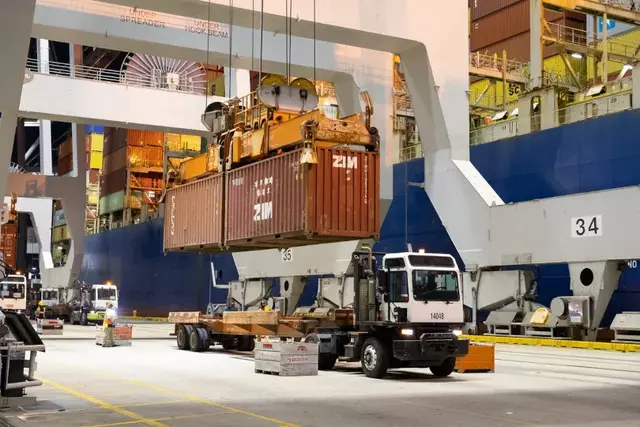Is Transportation a Good Career Path? lets explore it. Transportation plays a crucial role in our daily lives, impacting everything from how goods are delivered to how individuals commute to work. As the industry evolves with advancements in technology and a growing emphasis on sustainability, many are exploring whether a career in transportation is a good choice. This article delves into various job options, salary expectations, and the benefits of pursuing a career in this dynamic field.
Table of Contents:
Understanding the Transportation Sector
Logistics management, infrastructure development, and the transportation sector encompasses a wide range of activities, including the transportation of people and goods. As cities grow and economies expand, the demand for efficient transportation solutions increases, making this field ripe with opportunities.
The Importance of Transportation
Transportation is the backbone of economic activity. It facilitates trade, enables mobility, and supports various industries, from tourism to manufacturing. As a result, the transportation sector connects communities and promotes growth in addition to providing a means of transit.
10 Careers in Transportation

If you’re considering a transportation career path, here are 10 careers in transportation worth exploring:
Logistics Coordinator
Responsible for managing the supply chain, logistics coordinators oversee the movement of goods from suppliers to consumers. They optimize routes and schedules to ensure efficiency.
Transportation Engineer
Transportation engineers design and develop infrastructure projects like roads, bridges, and transit systems. They focus on improving safety, efficiency, and sustainability in transportation.
Controller of Air Traffic
The safe and efficient movement of air traffic is overseen by air traffic controllers. They coordinate the movements of airplanes during takeoff and landing while working in control towers.
Fleet Manager
Fleet managers oversee a company’s vehicle fleet, ensuring that vehicles are maintained, operated efficiently, and comply with regulations.
Public Transit Planner
Public transit planners develop and implement strategies for public transportation systems, focusing on accessibility, efficiency, and community needs.
Supply Chain Analyst
Supply chain analysts assess and optimize supply chain processes, identifying opportunities for cost savings and improved service levels.
Transportation Safety Specialist
These professionals focus on ensuring safety in transportation systems, conducting audits, and implementing safety protocols.
Shipping and Receiving Clerk
They manage the logistics of shipping and receiving goods, ensuring accurate inventory and timely delivery.
Transportation Consultant
Transportation consultants advise organizations on transportation strategies, policy development, and system improvements.
Railroad Conductor
Railroad conductors oversee the operation of trains, ensuring safety and compliance with regulations while managing crew and passenger activities.
Careers in Ground Transportation
Careers in ground transportation are particularly diverse, covering roles in logistics, transit planning, and vehicle operation. Ground transportation includes everything from buses and trains to trucking and taxis. Here are a few prominent options in this area:
Truck Driver

Truck drivers transport goods overland, often traveling long distances. With the growth of e-commerce, the demand for truck drivers continues to rise.
Bus Driver
Bus drivers play a vital role in public transportation, providing essential services to commuters. This job often comes with benefits like job security and pension plans.
Logistics Manager
Logistics managers oversee the supply chain, ensuring that products are delivered on time and in good condition. This role requires strong organizational and leadership skills.
Transit Operations Supervisor
These supervisors manage daily operations for public transportation systems, ensuring services run smoothly and efficiently.
Transportation Career Path and Salary
When considering a transportation career path and salary, it’s important to note that compensation can vary significantly based on the role, location, and level of experience. Here’s a breakdown of average salaries for some transportation roles:
- Logistics Coordinator: $45,000 – $75,000 per year
- Transportation Engineer: $60,000 – $100,000 per year
- Air Traffic Controller: $70,000 – $130,000 per year
- Fleet Manager: $60,000 – $90,000 per year
- Public Transit Planner: $50,000 – $85,000 per year
These figures indicate that many careers in transportation offer competitive salaries, particularly for specialized roles such as transportation engineering and air traffic control.
Educational Requirements
The educational path for a career in transportation varies widely depending on the specific role. Here’s a general overview:
High School Diploma
Many entry-level positions, such as truck drivers or shipping clerks, require only a high school diploma. Specialized training or certifications may be necessary.
Associate Degree
Roles like logistics coordinator or transportation planner may require an associate degree in a related field.
Bachelor’s Degree
Generally speaking, jobs like supply chain analyst or transportation engineer require an undergraduate degree in business, engineering, or a similar discipline.
Professional Degrees
Certifications can enhance job prospects and potential earnings. For instance, obtaining a Certified Supply Chain Professional (CSCP) designation can be beneficial for logistics professionals.
Benefits of a Career in Transportation
Pursuing a career in transportation comes with numerous advantages. Here are some key benefits:
Job Stability
Transportation is an essential service, ensuring that there will always be a demand for skilled professionals in this field. This stability is particularly important in uncertain economic times.
Diverse Opportunities
The transportation sector offers a wide range of job options, from technical roles in engineering to operational positions in logistics. This diversity allows individuals to find a niche that suits their skills and interests.
Competitive Salaries
As noted earlier, many transportation roles offer competitive salaries, especially for specialized positions. The potential for advancement can lead to even higher earnings over time.
Technological Advancements
The transportation industry is rapidly evolving with advancements in technology, such as autonomous vehicles and smart logistics. Working on innovative projects that have the potential to influence transportation in the future is an opportunity for professionals in this industry.
Contribution to Society
Working in transportation means playing a vital role in connecting communities, enhancing mobility, and facilitating trade. This sense of purpose can be incredibly rewarding.
Essential Technical Skills for Transportation Careers

Data Analysis and Management
Data analysis is crucial in the transportation industry, as professionals use logistics software to track shipments and optimize routes. Skills in data management enable workers to make informed decisions that enhance efficiency and reduce costs. Proficiency in tools like Excel and specialized transportation management systems is highly valuable.
Engineering and Design Proficiency
In transportation engineering, strong technical skills in engineering principles and design software are essential. Proficiency in CAD software and understanding civil engineering concepts help in designing infrastructure like roads and bridges. A solid foundation in mathematics and physics is also important for planning and executing projects effectively.
Future Outlook for Transportation Careers
The future of transportation careers looks promising, driven by trends such as:
Sustainability
As cities and companies focus on reducing their carbon footprints, there is a growing need for professionals who can develop sustainable transportation solutions.
Technological Integration
The integration of technology in transportation—such as electric vehicles, drones, and AI-driven logistics—will create new job opportunities and require specialized skills.
Urbanization
As more people move to urban areas, the demand for efficient public transportation systems and infrastructure improvements will continue to grow, leading to more job opportunities.
Conclusion
In conclusion, transportation is indeed a viable and rewarding career path. With a plethora of options ranging from logistics and engineering to public transit management, there’s something for everyone. The competitive salaries, job stability, and the opportunity to contribute to society make it an attractive field for many. Whether you’re drawn to careers in ground transportation or careers in transportation engineering, the future looks bright for those entering this dynamic industry.







